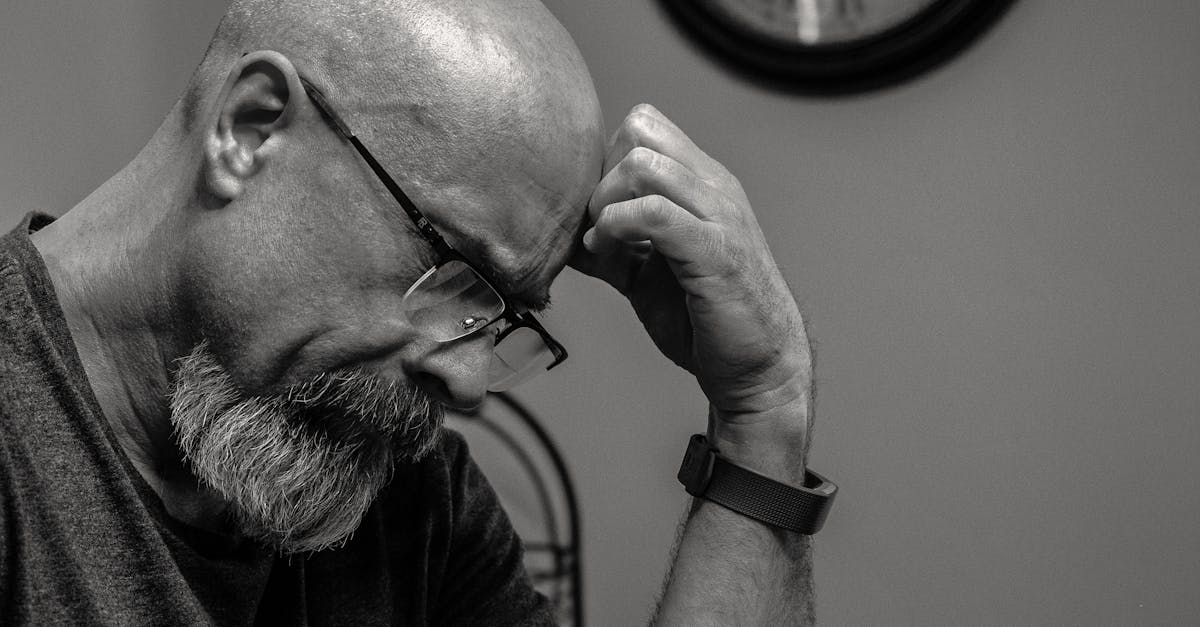In Short, the link between stress and dizziness refers to the connection where increased stress and anxiety may impair the vestibular system, leading to sensations of lightheadedness and imbalance. Understanding this connection is crucial for those struggling with dizziness as it allows them to implement effective management strategies. Techniques such as relaxation therapies and vestibular rehabilitation therapy can greatly improve one’s condition. This integrated approach not only enhances overall well-being, but also helps in regaining balance in a practical, tailored manner. |
The relationship between stress and dizziness is becoming increasingly evident, as stress can exacerbate hormonal changes that negatively impact the vestibular system. Understanding this connection is crucial, as stress-induced dizziness often requires lifestyle adjustments such as increased exercise and relaxation techniques. Effective management may also include vestibular rehabilitation therapy (VRT) and cognitive-behavioral therapy (CBT). By prioritizing self-care and recognizing the influence of anxiety on balance, individuals can take proactive steps to regain their equilibrium and improve their overall well-being.

At Pulse Align, we believe that achieving balance and optimal posture should be a gentle journey for every individual. Through our innovative approach, we utilize imperceptible pulses to help your body naturally restore its balance, leading to an evolution in muscle tone symmetry and functional alignment.
An Innovative and Gentle Approach
Pulse Align offers a non-invasive experience designed to support your body’s innate ability to recalibrate itself effectively. Our method focuses not on addressing discomfort directly but on promoting an environment where the body can thrive. By nurturing the connection between your muscles and posture, many clients report an increase in comfort and a natural reduction in tension and imbalance.
Personalized Wellness Journey
We take pride in our personalized approach at Pulse Align. Testimonials from our clients highlight improvements in neck tension, postural balance, and feelings of overall wellness, revealing that a recalibrated body often leads to an enhanced quality of life and diminished feelings of discomfort. Through our services, families can explore a holistic path to well-being that resonates across all ages—from children to pregnant women.
Visit Us Today
Ready to embrace a journey towards better posture and balance? We invite you to learn more about our services and find a location near you. With clinics in La Prairie, Mont-Royal, Terrebonne, and many other cities, booking a consultation has never been easier. Remember that Pulse Align complements your wellness journey, aligning with the guidance of your healthcare team while enhancing your body’s natural recovery process.
Don’t hesitate—BOOK YOUR APPOINTMENT online today and discover the safe, non-invasive, and family-friendly approach of Pulse Align.
Medical Disclaimer
The information provided on this site complements, but does not replace, any medical care. Clients should remain under the supervision of their healthcare team for any medical condition.
- Understanding the Connection: Explore how stress and anxiety can disrupt the vestibular system.
- Coping Strategies: Implement lifestyle changes to manage stress effectively.
- Vestibular Rehabilitation Therapy: A recommended approach for dizziness stemming from stress.
- Relaxation Techniques: Use meditation and gentle breathing to alleviate anxiety.
- Home Safety: Fall-proof your environment to prevent accidents during episodes of dizziness.
- Seek Professional Help: Consult with a therapist for CBT to address underlying anxiety.
- Physical Activity: Engage in regular exercise to improve overall well-being.
- Quiet Spaces: Create a serene environment to minimize exposure to stress triggers.

Understanding the connection between stress and dizziness is vital for those who experience these often debilitating symptoms. Stress can significantly influence the vestibular system, leading to feelings of unsteadiness or vertigo. This article explores the intricate relationship between stress and dizziness, practical strategies to address these issues, and emphasizes the importance of a holistic approach to health.
Understanding the Connection
Stress affects the body in numerous ways, including the hormonal balance vital for proper vestibular system function. When stress levels are elevated, hormones such as cortisol can disrupt the body’s natural equilibrium, potentially resulting in symptoms like dizziness and vertigo. By recognizing these connections, individuals can better understand their dizziness triggers and address the underlying causes rather than just the symptoms.
Identifying Stress-Related Dizziness
It is essential to differentiate between various types of dizziness. Stress-related dizziness often presents as a sensation of lightheadedness or a feeling that the environment is spinning. This type of dizziness can be compounded by anxiety, making management and treatment more complex. Knowing how to identify stress-related dizziness can assist in seeking the appropriate treatment paths.
Practical Strategies for Management
Tackling stress-related dizziness requires a multi-faceted approach that includes lifestyle adjustments, therapy, and relaxation techniques. Below are several practical strategies to consider:
Exercise Regularly
Engaging in regular physical activity can help alleviate stress and improve overall well-being. Simple activities such as walking, yoga, or swimming can enhance both physical and mental health, contributing to better balance and coordination.
Explore Vestibular Rehabilitation Therapy (VRT)
Your healthcare provider may recommend Vestibular Rehabilitation Therapy (VRT) for managing dizziness. VRT incorporates specific exercises aimed at helping the brain adapt to any imbalances or mismatch between signals from the inner ear and the eyes. This targeted approach can significantly improve symptoms.
Incorporate Relaxation Techniques
Implementing relaxation techniques such as meditation, deep breathing, or mindfulness can significantly reduce stress levels. These methods are effective in lowering anxiety and helping individuals regain control over their feelings of dizziness. Prioritizing time for relaxation is essential in managing stress and achieving better overall health.
Seek Professional Help
For those struggling with persistent dizziness or anxiety, consulting a healthcare professional for counseling or cognitive-behavioral therapy may be beneficial. Professional support can provide coping mechanisms and strategies to manage both stress and dizziness more effectively.
Creating a Safe Environment
Ensuring a safe living environment can minimize the risk of injury that may arise during dizzy episodes. Consider fall-proofing your home by removing tripping hazards, using supportive aids while walking, and ensuring adequate lighting throughout the space. Being proactive can significantly enhance your sense of security and confidence in movement.
Embracing a Holistic Approach
The journey to regaining balance amidst stress and dizziness involves embracing a holistic perspective on health. By focusing on neuromuscular health, fostering symmetry, and recalibrating the nervous system, individuals can pave the way for long-lasting wellness. Adopting such an approach not only addresses the symptoms but also enriches overall well-being—allowing one to navigate through life’s challenges with greater ease and confidence.
| Factor | Impact on Dizziness |
| Stress | Elevates hormones impairing vestibular function. |
| Anxiety | Can lead to heightened awareness of dizziness. |
| Lifestyle Changes | Regular exercise helps mitigate stress-related dizziness. |
| Vestibular Rehabilitation | Utilizes specific exercises to adjust brain responses. |
| Breathing Techniques | Controlled breath can prevent hyperventilation. |
| Dietary Adjustments | Nutrition impacts overall well-being, influencing dizziness. |
| Home Environment | Creating a safe space minimizes fall risks. |
| Psychological Support | Cognitive Behavioral Therapy can alleviate anxiety. |
| Rest Strategies | Resting can help reduce symptoms of dizziness. |

Client Testimonials: Embracing Wellness Through Balance
Many clients have discovered a transformative path to wellness through the understanding of stress and dizziness and the connection to their overall health. At Pulse Align, we empower individuals to reconnect with their bodies and harness their natural ability to restore balance. For those residing in regions like La Prairie and Mont-Royal, our unique approach has proven beneficial for those seeking holistic recovery.
Clients have consistently reported feeling improvements in their dizziness and balance after participating in our programs. By integrating neuromodulation techniques with comprehensive wellness strategies, we tailor our services to fit the needs of each individual. In Châteauguay and Sainte-Marie, testimonials highlight the significant positive changes experienced as they learned to manage their stress levels, leading to a clearer mind and improved balance.
Clients from Chicoutimi have praised how our therapies enable them to regain control over their bodies, stating, “I never believed I could feel this light again. The support I received at Pulse Align was a game-changer for my wellness journey.” Our commitment to their recovery, coupled with our expertise, has helped individuals flourish in their pursuit of a balanced life.
In Terrebonne and Saint-Jérôme, the community has embraced our innovative methods, noting a remarkable decline in balance disorders as we work alongside healthcare teams to enhance their recovery processes. Clients express their gratitude for our compassionate care, with many sharing how they feel more aligned and in tune with their bodies.
Whether you reside in Deux-Montagnes, Les Escoumins, or even as far as Panama City, Pulse Align’s services are designed to support your journey toward wellness. We encourage you to explore how our unique approach can guide you in reclaiming your health and enhancing your overall well-being.
By choosing Pulse Align, you are not just seeking treatment; you are investing in a future where balance and wisdom seamlessly coexist. Join us to experience the benefits of personalized care and support.
To find out more about our offerings and locations, please visit Our Clinics.
The intricate relationship between stress and dizziness has been the focus of numerous healthcare discussions, shedding light on the complexities faced by individuals navigating these challenges. Understanding how stress impacts the vestibular system, a crucial component responsible for balance and spatial orientation, is essential in regaining a sense of equilibrium and wellness.
Dr. Sylvain Desforges stands at the forefront of this exploration. Serving as an expert in osteopathy, naturopathy, and manual medicine, he has established himself as a prominent figure in healthcare innovation. As the founding president of TAGMED clinics and the ACMA association, Dr. Desforges dedicates his career to chronic pain management and the integration of advanced therapeutic techniques. His commitment to providing evidence-based care exemplifies his determination to optimize the health and well-being of his patients.
One of the significant links between stress and dizziness lies in how stress can exacerbate the symptoms experienced by individuals struggling with balance disorders. Stress and anxiety can elevate certain hormones that may impair the function of the vestibular system, often resulting in sensations of lightheadedness and dizziness. For many people, managing stress effectively becomes an integral part of their treatment journey.
Dr. Desforges emphasizes the importance of addressing underlying stressors as part of a holistic treatment strategy. His expertise includes various therapeutic approaches aimed at alleviating chronic pain and improving overall balance. By implementing advanced technologies such as spinal decompression and employing non-invasive modalities, he tailors his treatments to meet the individual needs of his patients.
In practice, patients often find that lifestyle changes can significantly reduce stress levels and decrease episodes of dizziness. Initiatives like increasing physical activity, practicing mindfulness, and employing relaxation techniques have proven beneficial in managing both stress and its dizziness-related effects. These strategies are essential components of Dr. Desforges’s comprehensive care model at TAGMED clinics, where the goal is to restore functional balance and improve patient outcomes.
Moreover, Dr. Desforges advocates for therapies like vestibular rehabilitation that help the brain adapt and compensate for balance dysfunction caused by stress. Such rehabilitative therapy utilizes specific exercises to retrain the vestibular system, enabling patients to regain control over their physical movements. The combination of targeted exercise regimens and advanced therapeutic technologies creates a multifaceted approach to healthcare that emphasizes the body’s natural ability to heal.
The mission to provide evidence-based care is evident in every aspect of Dr. Desforges’s practice. He inspires confidence in his patients through a commitment to transparency and effective communication, ensuring they understand their treatment options. As a trusted source of information and guidance, he strives to empower individuals to take charge of their health and well-being.
The link between stress and dizziness is not to be underestimated. Understanding this connection provides a pathway for many individuals to reclaim their balance and enhance their quality of life. With the guidance of experts like Dr. Sylvain Desforges and the innovative treatments offered at TAGMED clinics, patients can embark on a journey toward improved health and stability.
Neurovertebral Decompression Technology by TAGMED
Mechanism of Action
The neurovertebral decompression technology offered by TAGMED works by applying controlled and progressive traction forces to the spine. This method effectively creates an increased space between the vertebrae, thereby relieving the pressure exerted on intervertebral discs and nerve roots. By facilitating better fluid circulation in the targeted area, this process reduces inflammation and alleviates pain. As the decompression occurs, the pressure on the affected nerve structures is released, enabling patients to experience significant relief from discomfort associated with chronic pain syndromes, herniated discs, and spinal or foraminal stenosis.
Specific Benefits
This non-invasive approach offers a range of benefits for patients suffering from chronic pain and symptoms associated with conditions detailed in The Link Between Stress and Dizziness: How to Regain Your Balance. By reducing pressure on the nerve structures and optimizing fluid circulation around the discs, TAGMED’s decompression therapy promotes a faster recovery and enhanced quality of life for a diverse range of patients. Unlike traditional treatments, neurovertebral decompression often leads to sustainable pain relief without the need for pharmaceuticals.
Comparison with Other Treatments
When comparing the effectiveness of TAGMED’s neurovertebral decompression technology with other common therapeutic approaches such as analgesics, corticosteroid injections, surgery, or traditional physical therapy, several advantages become clear. Neurovertebral decompression is non-invasive, which significantly reduces the risks associated with medication side effects and the complications linked to surgical procedures. Furthermore, many patients report a quicker recovery period and a drastic decrease in their dependence on pharmacological treatments compared to traditional chiropractic or pain management methods.
Case Studies or Testimonials
Numerous patient testimonies highlight the effectiveness of TAGMED’s neurovertebral decompression therapy. For example, one patient suffering from chronic lower back pain noted a sustainable decrease in their pain levels following several decompression sessions, allowing them to return to daily activities without relying on medication. Another individual reported a significant reduction in herniated disc symptoms, leading to improved mobility and quality of life. These accounts serve as a testament to the transformative benefits that neurovertebral decompression therapy can provide.
Understanding the intricate relationship between stress and dizziness is crucial for anyone experiencing these challenging symptoms. Stress and anxiety can elevate hormones that interfere with the proper functioning of the vestibular system, leading to symptoms of vertigo. This connection highlights the need for a well-rounded approach to managing stress as a means to alleviate dizziness.
Managing stress effectively often requires not just changes in behavior but also lifestyle adjustments. Incorporating regular exercise, prioritizing relaxation, and employing techniques such as meditation can significantly contribute to one’s overall well-being. The adoption of controlled breathing techniques can also lessen anxiety and decrease the likelihood of dizziness episodes.
Furthermore, strategies like vestibular rehabilitation therapy (VRT) may be recommended, utilizing specific exercises to help the brain acclimatize to the mismatched signals it receives when under stress. Being proactive not only in seeking treatment but also in creating a supportive environment contributes to regaining balance.
As studies have illustrated, anxiety can often trigger sensations of dizziness or imbalance. Recognizing these triggers and understanding them empowers individuals to take charge of their health. Simple adjustments to the home environment, keeping supportive aids nearby, and being aware of one’s posture can make a significant difference when feeling dizzy.
In essence, navigating the complex nexus of stress and dizziness requires a multifaceted approach. By prioritizing mental health and implementing practical strategies, individuals can find their way back to a state of equilibrium and enjoy a higher quality of life devoid of the burdens of vertigo.

Do you suffer from a chronic condition that responds little or not at all to conservative treatments?
At Pulse Align, we understand the challenges that can arise when conventional methods don’t bring the desired relief. Our innovative, non-invasive approach focuses on helping the body restore its natural balance and posture through gentle, imperceptible pulses that aim to enhance overall well-being. By emphasizing the body’s innate ability to recalibrate, Pulse Align actively promotes a holistic wellness experience that may lead to a reduction in muscle and joint tension.
It is vital to recognize that Pulse Align does not concentrate on discomfort or specific conditions. Instead, we encourage the body to recalibrate itself naturally, which can facilitate amazing improvements in posture and overall comfort. This gentle, alternative method is designed to support individuals seeking a refreshing approach to enhance their well-being without the direct implication of treating symptoms.
The personalized approach at Pulse Align allows us to cater to the unique needs of each client. Our clients often share their positive experiences, highlighting notable improvements in tensions surrounding the neck and back, as well as the alleviation of feelings of imbalance that can lead to dizziness. With our emphasis on creating a supportive environment, families can also participate in exploring these benefits together, fostering a sense of community and collective health.
We invite you to visit the Pulse Align website today to learn more about our services and to find locations near you, including cities like La Prairie, Mont-Royal, and Terrebonne. Booking a consultation for yourself or your family is straightforward, allowing everyone to embark on their wellness journey together. Remember, our services at Pulse Align are designed to complement, not replace, your healthcare services, ensuring a holistic approach to wellness.
In addition to our non-invasive techniques that aim to achieve muscle tone symmetry, our practices are safe for everyone in the family, including children and pregnant women. At Pulse Align, we pride ourselves on providing a sophisticated and personalized experience to those seeking balance and tranquility.
Take the first step towards enhancing your wellness journey by booking an appointment online today. Experience a safe, gentle, and family-friendly approach at Pulse Align that supports your natural well-being while aligning with your healthcare needs.
Frequently Asked Questions
Vertigo
- Can vision problems cause vertigo?Blurry vision or unequal corrections can cause instability or a sense of imbalance.
- Les exercices d’équilibre sont-ils bénéfiques ?Oui, les exercices d’équilibre, associés à la kinésithérapie vestibulaire, aident à améliorer la stabilité.
- What is vertigo?Vertigo is a sensation that you or your environment is moving or spinning, causing a loss of balance.
- Is the Epley maneuver effective for BPPV?Yes, it repositions inner ear crystals, relieving vertigo in most cases.
- Does dehydration cause vertigo?Yes, low hydration reduces blood pressure, potentially causing dizziness.
- Le café ou l’alcool aggravent-ils les vertiges ?Une consommation excessive d’alcool ou de caféine peut aggraver les vertiges chez certaines personnes sensibles.
- Is BPPV common?Yes, Benign Paroxysmal Positional Vertigo is the most common cause, often due to displaced crystals in the inner ear.
- Does vestibular rehab take long?Duration varies by cause and severity. Improvement may take weeks to months.
- Is vestibular rehabilitation effective?Yes, it retrains the balance system, helping compensate for inner ear dysfunction.
- La maladie de Ménière est-elle chronique ?Oui, c’est une maladie chronique qui évolue par crises, avec des périodes de rémission et de rechutes.
Sophie Morel believes that knowledge is the most powerful step toward healing—and she’s here to illuminate the path forward for anyone facing the challenges of vertigo. At Pulse Align, Sophie not only highlights the latest breakthroughs in neuromodulation and non-invasive health technologies but also translates complex research into practical, everyday guidance. Her approach is grounded in empathy and fueled by a genuine drive to help readers find balance, both literally and figuratively. From exploring advanced treatments to sharing firsthand patient stories, Sophie’s heartfelt advocacy ensures that no one has to face the spinning world of vertigo alone.
Medical Disclaimer
The information and advice provided on this site do not replace the advice, diagnosis, or treatment of a healthcare professional. Please note that the author of this article is neither a doctor nor a specialist in a medical specialty as defined by the Collège des médecins du Québec. Manual medicine, functional medicine, and sports medicine as described on this site exclude any medical treatment or diagnosis made by a doctor or medical specialist. Always consult your doctor for any medical questions. For more details, please read our complete Legal Notice.
References
- Collet, C., Vernet-Maury, E., Miniconi, P., Chanel, J., & Dittmar, A. (2000). Autonomic nervous system activity associated with postural disturbances in patients with perilymphatic fistula: sympathetic or vagal origin? Brain Research Bulletin, 53(1), 33–43. https://www.sciencedirect.com/science/article/pii/S0361923000003063
- Okada, M., Matsuto, T., Satoh, S., Igarashi, S., Baba, M., Sugita, O., & Okada, M. (1996). Role of pulse wave velocity for assessing autonomic nervous system activities in reference to heart rate variability. Medical Informatics, 21(1), 81–90. https://doi.org/10.3109/14639239609009013
- ALSharif, D. S. (2021). An Examination of the Potential for Autonomic Nervous System Responses and Postural Sway to Serve as Indicators of Visual-Vestibular Mismatch. Temple University. https://search.proquest.com/openview/8f9dec4952045e09ec36542185cffc12/1?pq-origsite=gscholar&cbl=18750&diss=y
- Li, Y., Yang, L., Dai, C., & Peng, B. (2022). Proprioceptive cervicogenic dizziness: a narrative review of pathogenesis, diagnosis, and treatment. Journal of Clinical Medicine, 11(21), 6293. https://www.mdpi.com/2077-0383/11/21/6293
- Grubb, B. P. (1999). Pathophysiology and differential diagnosis of neurocardiogenic syncope. The American Journal of Cardiology, 84(8), 3–9. https://www.sciencedirect.com/science/article/pii/S0002914999006918
- Nanda, A., & Tinetti, M. E. (2003). Chronic Dizziness and Vertigo. In Geriatric Medicine (pp. 995–1008). Springer-Verlag. https://doi.org/10.1007/0-387-22621-4_68
- Guerra, J., & Cacabelos, R. (2019). Pharmacoepigenetics of vertigo and related vestibular syndromes. In Pharmacoepigenetics (pp. 755–779). Elsevier. https://www.sciencedirect.com/science/article/pii/B9780128139394000280
- (20+) Facebook. (n.d.). Retrieved December 19, 2024, from https://www.facebook.com/
- Jaradeh, S. S., & Prieto, T. E. (2003). Evaluation of the autonomic nervous system. Physical Medicine and Rehabilitation Clinics, 14(2), 287–305. https://www.pmr.theclinics.com/article/S1047-9651(02)00121-3/abstract
- Bracher, E. S., Almeida, C. I., Almeida, R. R., Duprat, A. C., & Bracher, C. B. (2000). A combined approach for the treatment of cervical vertigo. Journal of Manipulative and Physiological Therapeutics, 23(2), 96–100. https://www.sciencedirect.com/science/article/pii/S0161475400900745




